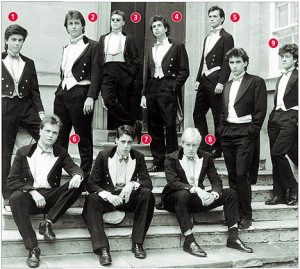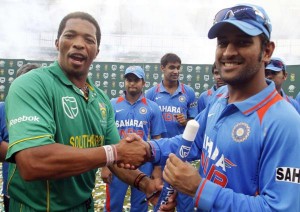
A gradual but inevitable descent into cricket-based loathing and bile.
The Five Most Pointless Matches Ever (That We Could Think Of)
Our Director of Social Media Operations was nursing a large glass of Tanqueray the other day, when he noticed a tweet marked for our attention. It turned out to be neither free alcohol nor anything cricket-related, but at least he’s now got an online girlfriend. However, only a short while later, Paul Edwards (@thetoweledwards) tweeted us, and this certainly was cricket-related, so the Director added the subject to the top of the 51allout weekly meeting agenda, demoting “Kingfisher Beer (low supply)” to the number two issue. Anyway, here’s the tweet that sparked our interest:
PODCAST THEME ALERT! What is the most pointless game of cricket ever played?
We thought this question too darn good to deal with adequately within the confined scope of a podcast, so we’ve adapted the topic to an article instead. Thanks Paul!
England vs. West Indies, 2011
As we may have mentioned before, 2011 was a very good year for the England cricket team, particularly the period of the summer which saw them kicking India all over the country (4-0 in the Tests, 3-0 in ODIs, 1-0 in the T20, in case you were wondering). But then, after the India series, England met the West Indies for a brace of T20s that were some kind of icing on the summer’s cake – an icing made of shit.
Graeme Swann was captain and his team included four debutants across the two games. The West Indies side included even more spring chickens: six different players were given their caps, most of whom we’ve completely forgotten. That England won the first by 10 wickets and lost the second by 25 runs (bowled out for 88) is largely irrelevant – the pointlessness of the games is derived from the fact that a TV deal arranged around the Stanford Super Series needed to be fulfilled. If you really want, you can read our reviews here and here. Though we suggest you do something more productive instead – like making a model galleon, or counting the blades of grass in your garden.
England vs. Scotland, 2012
We’re all for the leading international teams – and England – playing the Associate Members on occasions, to try and help develop the game around the world and improve the abilities of the lesser nations – and England. However there were eyebrows raised when a match between Scotland and England was announced, to take place in August 2012. This would be shoehorned inbetween the second and third Test matches against South Africa, as well as smack bang in the middle of the England Lions vs. Australia A matches. If nothing else, the match would have given opportunities to the drib and drab players towards the bottom of the England Ladder, but really, it was a match hard to get excited by, especially south of the border. Amusingly, the match was called off three weeks in advance due to flooding at Edinburgh’s Grange ground.
Eton vs. Harrow, forever and ever
History is good. Tradition is fine. Respect for the game’s origins, its past and its values are paramount. We get that. In fact we’re actually a very old-fashioned bunch: in the twitter furore and subsequent Pietersen vs. Swann and Anderson malarkey, we’re very much in the Chris Tavare camp. The first match between Eton and Harrow was in 1805 (although cricket had been played at such public schools for several decades already by then); it is certainly one of the longest-running cricket, indeed sporting, fixtures in the world.
But why the hell should it continue to be played at Lord’s? It’s not as if these schools don’t have rather fine playing fields of their own. The normal school cricket competitions don’t have a final at Lord’s – perhaps there should be, to replace this antiquated fixture. So on its own, not particularly pointless, but because it gets to use the hallowed turf of St John’s Wood every bloody summer, purely on the grounds of tradition, then there becomes no point.
The Friendship Cup, 2012
Talking of tradition, the Friendship Cup is one of the great ones. From as far back as 2011, South Africa and India have been meeting in a one-off T20 match. The inaugural was fitted in at the end of a tour, notionally to celebrate 150 years since the arrival of the first indentured-labourer Indians to South Africa and to send Makhaya Ntini off into retirement. That match also featured a Bollywood concert. However the second fixture, days after the final of the Asia Cup, days before the start of the Indian Premier League and seemingly moments since the South Africans had returned from a tour of New Zealand, was the definition of a one-off; it was also entirely meaningless apart from insofar as bank balances were concerned. Absurdly, the match was marketed as a tribute to the very much alive and still playing Jacques Kallis. That the match was rain-affected and determined via the Duckworth-Lewis method (generally farcical when used in T20 matches) is somewhat appropriate. Luckily, as far as we can tell, the friendship has ended and there is no Cup on offer in 2013.
Britain vs. Rest of the World, 2002
Cricket, indoors, on a rugby pitch? What could possibly be wrong about that?
We often think it would be rather fantastic if English cricket grounds had roofs (we write this as yet another match gets shortened to farcical lengths because of rain), though even we, despite our bluesky thinking and never say never attitude, appreciate there are a myriad of reasons why this isn’t feasible. However in October 2002, Power Cricket was born. It also, as far as we’re aware, died. The Millennium Stadium in Cardiff has, in its short history, seen some fantastic events (Bruce Springsteen and the E Street Band, 2008), some dire matches (the 2005 FA Cup Final), but surely no moments as pointless as Shahid Afridi scoring 12 off a single shot by hitting the roof. Sadly, and this really pains us, Robin Smith is quoted on what remains of their website, as saying “it was the best cricket event I have ever been involved in.” Robin played in 15 Ashes Tests, two World Cups and scored three hundreds against the West Indies.





No Comments
Post a Comment